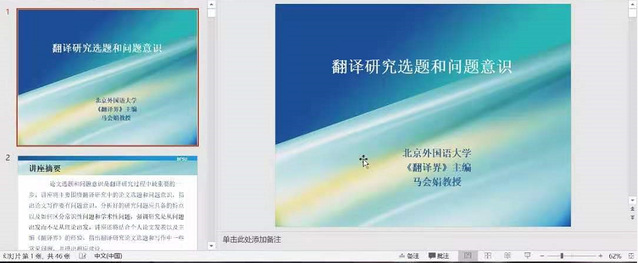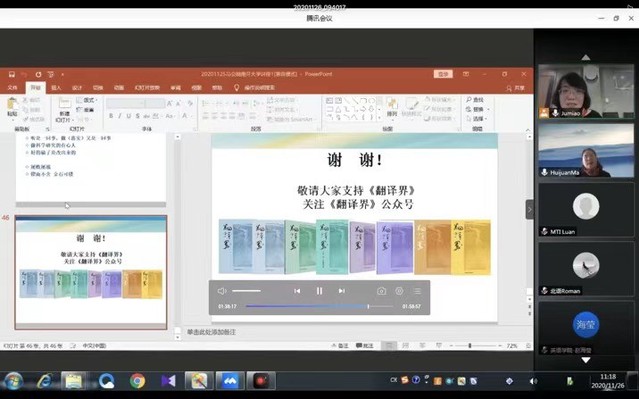
On November 26th, invited by Professor Miao Ju, Director of Translation Studies Center in Nankai University, Professor Ma Huijuan, doctoral supervisor in Beijing Foreign Studies University, Chief Editor of the journal, Translation Horizons, and outstanding alumna of Nankai Unviersity, gave an online academic lecture named “Topic Selection of Translation Studies and Problem Consciousness.” More than 100 people attended this lecture, including graduate and doctoral students in the College of Foreign Languages in Nankai University. Besides, this academic lecture named “Approaching Famous Chinese Journals” is a part of the serial activity, “The Innovation Forum of Graduate Students” held by Department of Graduate Student Affairs of CPC Committee in Nankai University. And this activity invites off-campus chief editors of well-known Chinese journals to give lectures, analyzes front hotspot issues and introduces the idea of running journals and the standard of paper selections in order to instruct graduate students to publish articles of high-level.
The lecture mainly covered six aspects, including what people study in translation studies, how to select a topic in translation studies, literature review and topic selection, papers writing for international journals and publication, common problems in paper writing and case analysis. And the explanation of examples ran through the whole lecture. At the beginning of the lecture, Ma Huijuan started from the speech given to new students in Beijing Foreign Studies University, initially clarified that translation studies could not be equated with translation theory studies, and emphasized that students should possess problem consciousness, studying according to problems rather than a certain theory. Then she mentioned that students were supposed to distinguish problems of common sense and academic problems and put forward research questions that make sense, break new ground and were intriguing for other researchers.
Ma Huijuan elaborated the procedure of writing a paper, how to innovate and some points of topic selection for attention. She also pointed out methods of studying problems, such as attaching importance to reading books and periodicals in the field, paying attention to the research progress of scholars and enhancing the academic accumulation and consciousness of scientific research in order to reach a point where students read extensively and are fully prepared and then make achievements. Furthermore, she explained the significance of literature review for topic selection and made some suggestions on submitting paper to international journals for publication. Finally, she encouraged students to be people who set their mind on doing scientific research and said that writing was a tough process, so only keeping plodding away at research could lead to success.

Miao Ju gave a high praise to this lecture and made excellent comments. Miao Ju said that Ma Huijuan was an outstanding alumna of Nankai University who was a pride to Nankai students and a good role model for middle-aged and young scholars to learn from. The content of lecture was detailed and in-depth, which displayed her rigorous spirit and attitude to scholarly research and summarized her years of experience, research perception and learning understanding. The lecture itself also reflected a complete scientific research process and explained the profound in simple terms with clear thought and structure. Students could see the conception of scientific research through the lecture and it could also be regarded as an excellent paper writing example. Besides, Miao Ju also gave a high praise to the scientific research level of the journal, Translation Horizons, and thanked Ma Huijuan again for her contributions to her alma mater, Nankai University and her support for the doctoral unit of translation studies.
This lecture is Ma Huijuan’s empirical summary of her years of translation studies, teaching translation courses and leading graduate and doctoral students to do research. It was also an impressive sharing meeting with rich content where the speaker explained the profound in simple terms and drove her point home. In the question session, students actively asked questions which she answered in detailed and students said that they benefited a lot.



